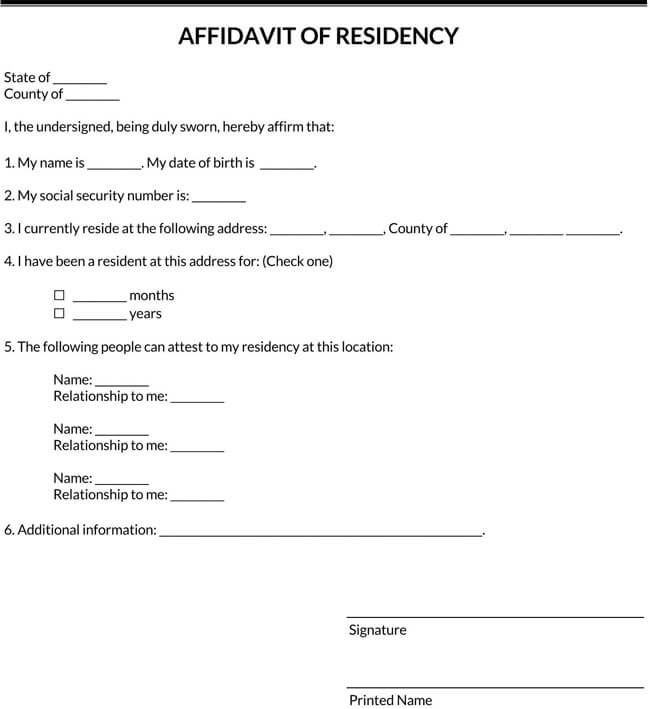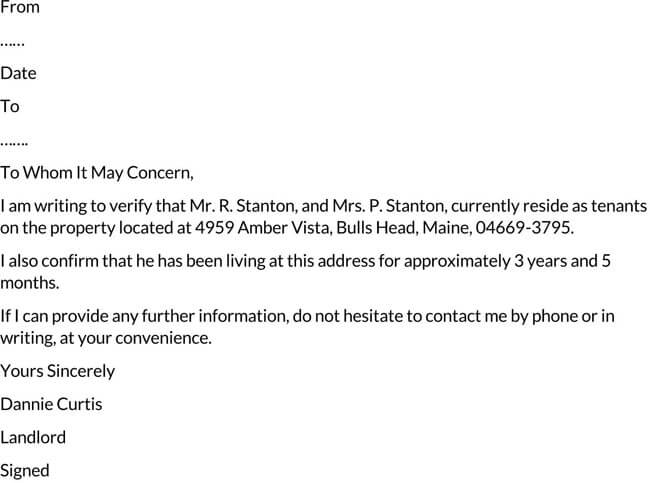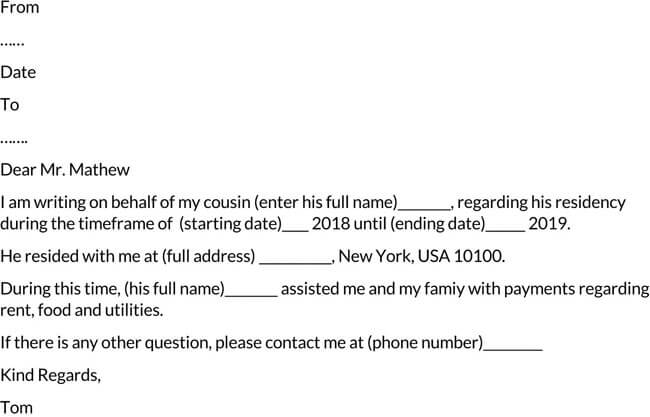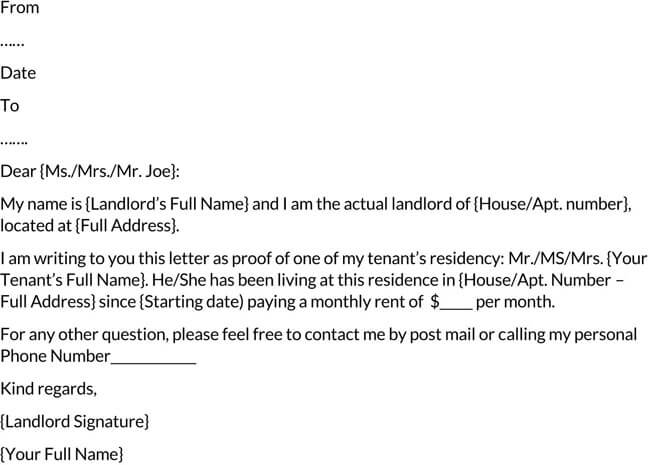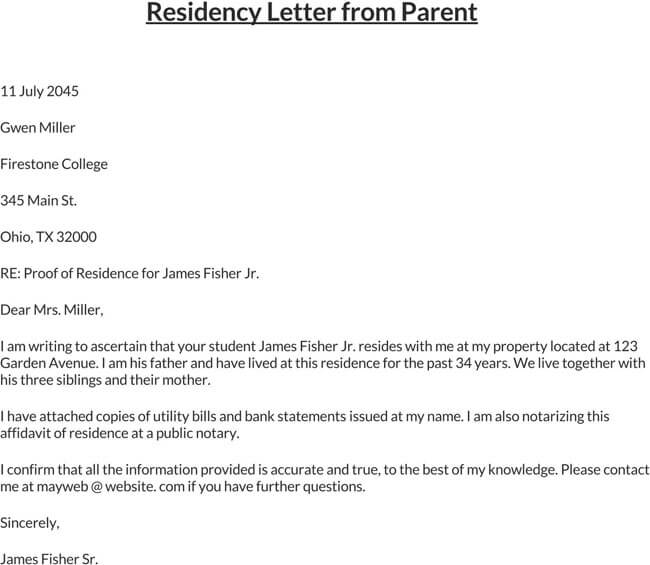An affidavit of residence or proof of residency is a letter required when registering for schools, visas, and national or state programs. While it is not a requirement for most places, such as public libraries or the Department of Motor Vehicles- these mostly require you to show a utility bill/lease. Some agencies may ask you to provide official proof of residency letters. As an employer, landlord, or family member, you need to have a clear understanding of what an affidavit of residence letter is, how to effectively draft one, instances where it is necessary, and what to include in the letter.
This well-explained article will provide you with everything you need to know about writing an Affidavit of Residence Letter whenever you are needed to write one.
An affidavit of residence letter is written by an employer, a landlord, or a family member, depending on the letter’s circumstances and need.
When preparing to write the proof of residence letter, you should first understand the requirements of the letter. Some agencies might require you to complete some documentation and follow a laid-out procedure. For example; You will be required to disclose certain information such as your name and residence address.
An Affidavit of Residence, otherwise commonly known as proof of residency, is a formal document used to confirm that a person lives where they say they do.
In other terms, it is a sworn statement that a person lives at a specific address. The document should be notarized, meaning that it should be signed by a notary public.An Affidavit of residence is also referred to as Proof of Residence Affidavit, proof of Residency Affidavit.
Some agencies will require that the letter be signed by a landlord. Therefore, while writing one, you should always ask for their consent first. Other agencies will require that you declare the residency length in that particular state, province, or city. You might also be obligated to provide additional supporting documents like your present lease agreement, residence purchasing contract, and current utility bills. Finally, most organizations demand that you notarize the Affidavit of residence letter- which means that it should be signed by a notary public.
Commonly Used Terms in Affidavits of Residence Letters
You will most likely come across the following terms in typical proof of residency letters thus, it is important to understand their meaning.
These are:
Residence—This is defined as the place where a person lives or dwells with some permanence. A residence maybe a house, an apartment rented for more than six months, condominium. A residence can either be owned or rented by an individual.
Landlord— This is simply the owner of the property that is being rented. Depending on the use of the proof of residency letter, the landlord’s signature might be a common requirement among most organizations for the Affidavit to be considered valid.
Length of Residency— This is the period in which the person has lived in the given rented property. Some agencies might require one to declare their length of residency in a given residence.
Notary public— This refers to the individual who authenticates the Affidavit of residence before submitting it to the requesting organization or individual.
Affidavit of Residence Vs. Affidavit of Domicile
Most people confuse these two terms bur they are used for different purposes. The difference between affidavit of residency and affidavit of domicile is given below:
| Affidavit of Residence | Affidavit of Domicile |
|---|---|
| An Affidavit of Residence is a sworn statement that a person lives in a specific address as may be required by employers, colleges, schools, courts, or banks. | An affidavit of Domicile is a legal document that verifies a deceased person’s last legal residence to transfer specific types of assets to their heirs. |
Basic Elements of Affidavit of Residency
Remember to maintain formality throughout the letter as this is an official and legal document therefore some components are essential to be mentioned in affidavit of residency.
These essential components are:
Length of residency
After addressing your letter professionally and correctly, it is time for you to write the body of the letter. In the body, use the first paragraph to declare the length of time you have lived in the given residence. While writing this part, you need to be keen and as precise as possible. Include the month, day, and year if possible. If you are oblivious of the exact date you moved to your current residence, just write the month and the year only.
The names of other residents
If you are required to include other neighboring residents’ names, don’t hesitate to do so. Include how long they have resided in the area with you if they have resided for a varying amount of time. This section is especially essential if you are verifying your child’s address to be accepted into a district or state school.
The date of birth and relation with the individual
It is very important that you specify the type of relationship you have with the individual trying to prove their residence. If you are a family member, you should write the date of birth for your child and indicate that you are their legal guardian or biological parent. If you are their spouse or roommate, you should specify this in the Affidavit. If you are a landlord, then specify that this person is your tenant and proceed to even include the length of time they have lived in your property. Ensure that the information you have provided is true to your best knowledge as you are swearing under oath that you are truthful.
Notary public’s statement requirement
Writing an affidavit means that you are swearing under oath that you are truthful. Place an oath beneath the above statements, certifying that the information you provided is accurate and true to your knowledge. By doing this, you are making yourself legally responsible for perjury charges if the statement you provided is found untrue later on.
Writer’s signature and date of the letter
Before signing off the letter and writing your full legal name as written in the first section of the letter, you should add a closing phrase. For example, “With Regards” or “Sincerely” followed by your name and signature. The closing phrase should appear two single-spaced lines below the last sentence of the Affidavit. The letter’s date should then be written in the lines between your typed name and the space you have created for the other involved parties to sign.
Required signatures of the parties
If there are other parties involved that need to sign the Affidavit, for example, the landlord or the notary public, create a space for them to sign the letter. This should be at the very bottom part of the letter.
After writing your proof of residency letter, including the elements mentioned above, you should take the letter to any local notary to have it notarized. You can find notaries in any government offices in your state or at any mailing counter.
Basic Steps to Consider
Before writing an Affidavit of residence letter, you must first seek your landlord’s consent and that of a public notary. Otherwise, you cannot move past the primary step.
Such as;
After obtaining their approval, your next step should be to write the actual proof of residency letter. In the letter, you should first write the letter’s heading, that is, “Affidavit of Residence” or “Proof of Residence.” This section should be bolded, centered, large and straightforward for easy understanding.
After you’ve clearly written your subject line, proceed to date your letter. A proof of residence letter is a formal official document. This implies that it should be dated and the date should be current. It is advisable that you write the date of submission if you had already drafted the letter. While you are writing the date section, make sure you write it two lines below your centered subject-line aligned to the right side of the letter.
The third step of writing a proof of residence letter involves adding your contact information. This should be written at the top left side of the page. Adding your correct contact information is very important, and it is considered mandatory to make it easier for your letter’s recipient to contact you. In this segment, make sure to include your full legal name, your complete address-including your email and mailing address, your mobile phone or telephone number, and your province or state. The contact information section should also be written below the subject line aligned to the page’s left side.
After writing your contact information, proceed to the fourth step, which involves addressing the individual or the company. Usually, this is the starting point of writing your Affidavit of residence letter. Formally and professionally address the individual or the company that asked for the proof of residence letter. While at it, include the full name and title of the recipient. This only applies when you know the person you are addressing the letter to, and you are sure of their legal name and title. However, if you are not sure whom to address the letter to, then the phrase “To Whom It May Concern” is a safer option.
From there, you can proceed to write the body of your letter that will contain all the elements already discussed in this article in-depth.
When is an Affidavit of Residency Needed?
Various life scenarios might require you to have an affidavit, and sometimes writing one may even be voluntary. For instance, in family law, you will be required to complete a financial affidavit as part of the discovery process.
Completing an affidavit in this circumstance may not be the same as in a written affidavit because you are not stating a series of facts. The circumstances that may warrant you to write an affidavit of residency are following;
When admitting your child to a public school
Most schools require you to prove your child’s residency to be admitted to a state school. This is to ensure that the child is living at the location as specified by the parent or legal guardian.
Department of Motor Vehicle
To apply for a driver’s license in any given state, you must provide your Affidavit of Residence letter. This also applies when you are applying for street parking after moving.
Tax purposes
Sometimes, you may be asked to prove your residency while filling out state and federal tax-related credentials.
Employment
While this does not necessarily apply to all companies and institutions, some employers ask for proof of residency letters from job seekers to verify their contact information. This especially applies to companies that follow a secure selection and recruitment process.
Public retirement programs
An affidavit of residence letter is necessary while registering and receiving funds through a public retirement program, for instance, receiving retirement funds from the Teachers Retirement System of Georgia.
Child Support Purposes
In a family court, during divorce proceedings, the court may demand an affidavit of residence to verify the current address of the custodial parent for school registration and child support purposes.
To qualify for in-state tuition rates
Colleges and universities may require you to prove your residency to be entitled to in-state tuition rates.
Medical benefits
An affidavit of residence letter is also necessary when you want to register and qualify to receive medical benefits from your state, such as receiving medical benefits from the MassHealth program.
How to Prove Residency
Proving your residency is sometimes necessary whenever you are trying to verify your eligibility to benefit from government-initiated programs and projects.
You can prove your residency through the steps below:
Write an affidavit of residence letter
Basically, this is the first step to take to prove your residency. Creating the proof of residency letter serves as a sworn testimonial that you reside at a particular address, as stated earlier.
From there, you can take the letter to a notary public to have it notarized and make it completely authorized.
Attach evidence
To verify your proof of residency letter, you must attach and submit the residential evidence documents with the address you have provided on your letter printed on them. Typically, you need at least two documents that can be used as proof of residency to serve as evidence you live in that address. These supporting documents include Voter registration card, Real Estate deed, Utility bill, Mortgage statement, Health insurance card, Bank statements, Tax Return statements, Paycheck, Residential Lease Agreements, Vehicle title/Registration, Driver’s license, among others.
Submit the affidavit letter and supporting documents
The final step of proving residency involves submitting the letter with the relevant supporting documents to the organization or individual who asked for residency proof.
Consequences of Not Having an Affidavit of Residence
An Affidavit of Residence can be used in many circumstances to swear an oath of residency. Since they are filed with the local court, the information provided in the document is considered true and to the best knowledge of the affiant. An attorney can use your proof of residency so that you do not have to physically appear in a court of law or any other official legal proceeding. This can save you a lot of time and a considerable amount of money. However, if you do not have proof of residency, then the court will be forced to summon you to court physically, and that can be financially straining and time-consuming.
Affidavit of Residency letter is sometimes mandatory during certain judicial proceedings, such as in estate planning issues and family law proceedings. If you lack this document, it implies that other legal instruments are not considered valid as well. Proving their validity might be very difficult.
Besides the courtroom, an affidavit of residency letter is considered very useful. Banks, insurance companies, employers, and State Document Registration requires you to have this legal document. If you do not have it, then you might not qualify for a loan from the bank, you might be denied insurance cover, you might fail a job interview that you could have qualified for if you had an affidavit, or you might not qualify for a visa or other government-provided service.
Finally, some state departments may demand that you present your proof of residency whenever you are applying for vital utility services such as water connection, telephone, electricity, and gas supply. If you lack this document, then you might be deprived of basic needs. Hence, it is important that you acquire your Affidavit of Residence, if you do not have one yet, and make it legal by notarizing it.
Free Affidavit of Residency Templates
Do you want to create an Affidavit of Residency Letter, and you are stuck? Use our free, premium, and professionally-designed downloadable notary proof of residency templates that you can edit and print instantly.
Frequently Asked Questions
What are the three proofs of residency?
One can prove their residency through the following three approaches:
Proving residency using a Notarized Affidavit of Residence: In this method, you can prove your residency by writing an affidavit of residence letter, which will then be notarized to make it valid.
Proving of residency of college: Here, you can register in a college which will automatically ask you to provide residential proof in the state. In most cases, you must have lived in the area for not less than 3 months.
Identification of local requirements: Under this approach, you can prove your residency by identifying the frequently used identification proofs such as utility bills or determining the company’s specific requirements, which will then be searched online, thus proving your residence.
What is acceptable as proof of address?
These documents such as a government-issued identification card, valid Driver’s License from the Department of Motor Vehicles in a given state, Utility bill such as gas, telephone, water, electricity, Lease Agreement or Mortgage Statement, Bank Statements, Insurance Policy Statements, Posted mail with the applicant’s legal name printed on it, Voter Registration Card, College Admission Papers considered acceptable forms of proof of address;
Conclusion
An Affidavit of residence is a valuable document, especially to those individuals who lack proper documentation to prove their residence. While preparing to write the proof of residency letter, you should consult your landlord if applicable. You also have to have your other supporting documents ready and have your letter attested by a notary public to obtain a final notarized affidavit of residence that you can use to prove your address. Our article has provided you with the info you need to know about Affidavits of residence. With this information, you are better positioned to understand the meaning and importance of affidavits. The Free templates provided herein will also serve as a reference to you as you draft your proof of residency letters anytime.
